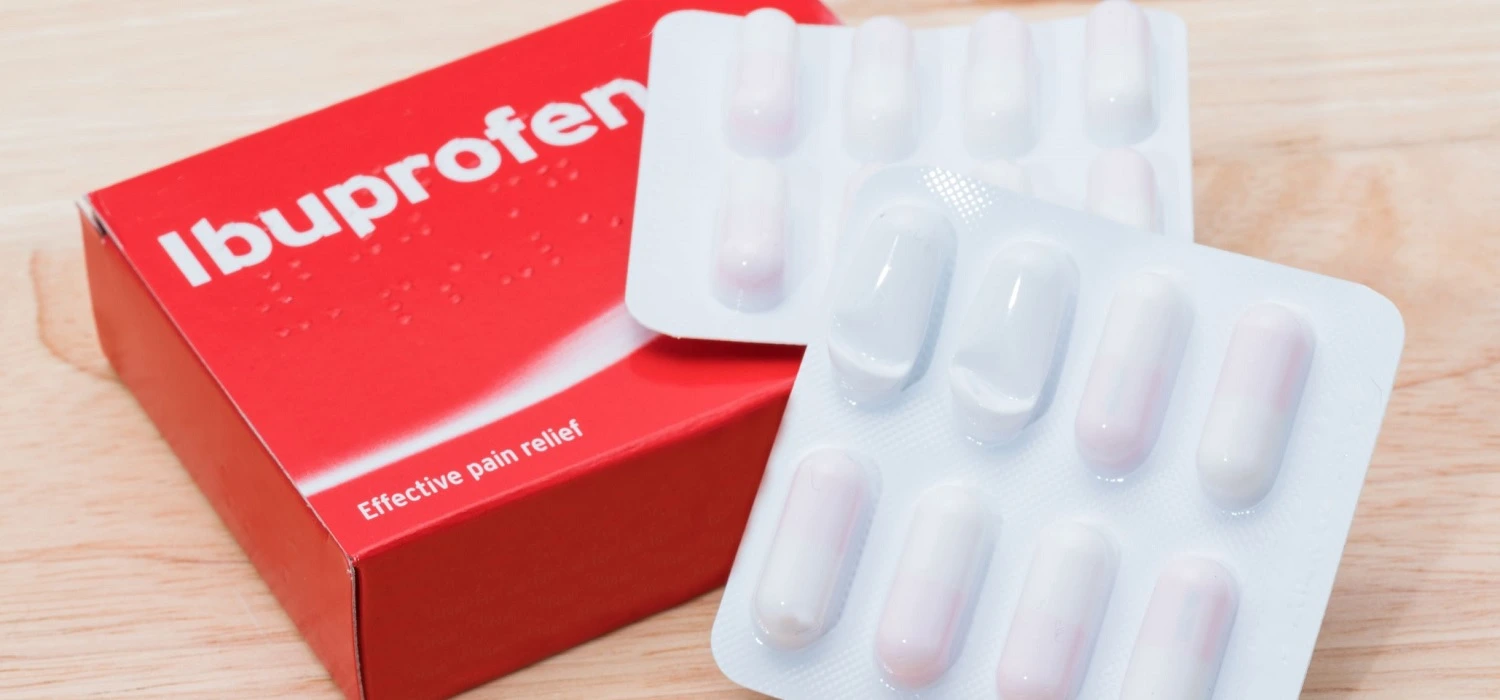Last Updated on: 29th December 2025, 08:55 am
Learn about ibuprofen and oral health connections, how it relieves pain and reduces inflammation, and how to minimize potential risks.
Dental pain is one of the most intense types, prompting thousands of people to visit the dentist every year. The causes of tooth pain are varied: an infection, fracture, a maladaptive restoration, cavities, and grinding teeth (bruxism), among others.
Many patients self-medicate to control dental pain while waiting, for some of these medications are NSAIDs (Non-Steroidal Anti-Inflammatory Drugs) such as Ibuprofen. But is ibuprofen safe to relieve tooth pain?
How does Ibuprofen Work?
NSAIDs are drugs that have anti-inflammatory, analgesic, and antipyretic properties, that is, they relieve inflammation, pain, and fever. The most common used to control dental pain are aspirin, naproxen, ibuprofen, diclofenac and celecoxib.

The function of NSAIDs is to block or stop the production of certain chemicals (prostaglandins) in the body that cause inflammation, pain, and fever. Its greatest effectiveness is in controlling pain generated by an inflammatory process.
If you want to learn about natural healing tips for dental pain, check our comprehensive guide about essential oils for toothache to help you relieve the discomfort even at home.
In dentistry, NSAIDs, such as ibuprofen, are used to:
• pain and inflammation after a dental or surgical procedure
• reduce or soothe dental pain and inflammation caused by an infection
There are a wide variety of over-the-counter medications with various trade names that contain NSAIDs, so when buying a pain medication, it’s important to look at the label to find out the contents.
Ibuprofen and Oral Health
Dental pain has a variety of causes, the most common being dental caries, gum disease, infections, abscesses, and inflammation of the nerve or dental pulp (pulpitis).
NSAIDs in general, including ibuprofen, work well to relieve dental (odontogenic) pain but do not eliminate the cause of the pain. Use is temporary, while the patient waits to be checked by a dentist, who will explain the origin of the pain, and the indicated treatment to prevent the problem from advancing, as well as any complications.
Is it Safe to Use Ibuprofen?
Yes, it is safe to use it in low doses and for short periods, as long as you have a prescription. The uncontrolled use of this and other NSAIDs can cause serious effects in certain patients, such as those who don’t coagulate bleeding, pregnant women, and people allergic to NSAIDs.
Some side effects will likely occur during its use, such as:
1. stomachache
2. constipation
3. diarrhea
4. gas
5. stomach acidity
6. nausea
7. vomiting
8. dizziness

As far as possible, it is recommended not to take any medication without a prescription for the following reasons:
• The effects of the drug may vary, depending upon the condition of the patient: age, any systemic disease, pregnancy, and use of other medications. In many cases, the medication may affect the patient’s safety.
• Lack of knowledge: Generally, a patient is unaware of the dose, the frequency of administration, and the duration of the treatment.his ignorance can generate serious adverse effects.
• Through pain, the body warns that something is not right: When pain medicine is taken, but the cause is not treated, diseases that are likely to progress and become more complicated if not detected in time can be overlooked.
When is it Not Safe to Use Ibuprofen?
NSAIDs are normally safe for healthy patients, but they should not be used in patients with the following conditions:
• Allergy to drug contents
• Gastritis or history of ulcer or gastric bleeding.
• Pregnant women, especially in the second and third trimesters
• Hypertension or those who have suffered a heart attack less than 6 months ago
• Those who take anticoagulant medications or have bleeding disorders

Some recommendations to keep in mind regarding the use of NSAIDs, such as ibuprofen, are:
• Aspirin is not recommended for use in children, as it has been shown to cause severe liver and brain damage.
• Never consume doses higher than those prescribed by the health professional since instead of boosting its effectiveness, the risk of presenting side effects increases.
• In some cases, combining Ibuprofen with other medications such as acetaminophen (Tylenol, acetaminophen) may be safe, but if the recommended dose is exceeded, this combination may increase the risk of toxicity and serious side effects such as kidney failure, epigastric pain, heart failure and an increased risk of bleeding and a digestive hemorrhage.
• If you are taking NSAIDs and experience chest pain, shortness of breath or difficulty breathing, weakness in one part or side of the body, or sudden slurred speech, stop the medication and seek immediate professional help.
• Do not use NSAIDs for pain related to orthodontic treatment, as this can stop tooth movement. In case of severe pain, take paracetamol.
Why go to the Dentist?
Ibuprofen can be used temporarily to relieve local discomfort, but the patient should seek dental care as soon as possible.
After taking Ibuprofen, you feel an improvement in discomfort or dental pain; but not treating the origin of the pain can cause dental problems to progress. It is possible in the future not only to lose teeth and generate a dental infection but also to compromise the patient’s life.
It is recommended to go to the dentist for periodic check-ups at least every 6 months, or in case of pain, seek immediate treatment since in the initial stages, most dental diseases are easy to solve. The more the disease progresses, the more difficult it will be to treat.
Conclusion
Everyone should learn to recognize the signals that the body gives. In the case of dental pain, they tell you that something in the mouth is not right and should be checked by a professional. Self-medication, although it can improve discomfort, it is not the most effective nor the safest solution. The cause of the pain must be eliminated since any oral disease can progress, worsen, and be difficult to treat in the future.
Frequently Asked Questions
Should you take ibuprofen for dental pain?
Yes, you can take ibuprofen for dental pain as it is effective in reducing inflammation and providing pain relief. However, it should only be used as a temporary measure until you can see a dentist for a proper diagnosis and treatment of the underlying cause of the pain.
Can I take ibuprofen before dental work?
Yes, ibuprofen is commonly prescribed to reduce pain and inflammation after oral surgery. It helps manage postoperative discomfort and swelling, allowing for a more comfortable recovery process.
Does ibuprofen cause pain?
No, ibuprofen does not cause pain; it is an analgesic and anti-inflammatory medication designed to relieve pain and reduce inflammation. However, if taken inappropriately or in high doses, it can cause side effects such as stomach pain, nausea, or gastrointestinal issues.
How does ibuprofen affect oral health?
Ibuprofen can positively affect oral health by providing temporary relief from dental pain and reducing inflammation. However, it does not treat the underlying cause of dental issues. Overuse or prolonged use without professional guidance can lead to side effects and potential complications, making it essential to consult a dentist for ongoing dental problems.
Can I take ibuprofen before dental work?
For adults, the typical dose of ibuprofen is 200-400 mg every 4-6 hours as needed, not exceeding 3200 mg per day. It is crucial to follow the dosing instructions provided by your healthcare provider or the product label and not to use it for more than a few days without consulting a dentist or doctor.
Share:
References
1. Crighton, A., McCann, C., Todd, E., & Brown, A. S. (2020). Caution with NSAIDs. British Dental Journal, 228(8), 568. https://doi.org/10.1038/s41415-020-1543-5
2. Ibuprofen. (Reviewed: February 15, 2023). MedlinePlus Drug Information.
https://medlineplus.gov/druginfo/meds/a682159.html
3. Ibuprofen – Oral. (Reviewed: August 2021). HealthLink BC. https://www.healthlinkbc.ca/medications/ibuprofen-oral
4. Ibuprofen Oral: Uses, Side Effects, Interactions, Pictures, Warnings & Dosing. (s. f.) WebMD. https://www.webmd.com/drugs/2/drug-5166-9368/ibuprofen-oral/ibuprofen-oral/details
5. Malka, T. (Reviewed: December 2, 2021). Taking Acetaminophen and Ibuprofen Together. K Health. https://khealth.com/learn/medication/taking-ibuprofen-and-acetaminophen-together/
6. Moore , P. A. , Ziegler , K. M. , Lipman , R. D. , Aminoshariae , A. , Carrasco-Labra , A. , & Mariotti , A. (2018).Benefits and harms associated with analgesic medications used in the management of acute dental pain. Journal of the American Dental Association, 149(4), 256-265.e3. https://doi.org/10.1016/j.adaj.2018.02.012
7. Morales-Brown, L. (Updated: February 10, 2023). Best medication for toothache: Types. Medical news today. https://www.medicalnewstoday.com/articles/best-medication-for-toothache
- Nayibe Cubillos M. [Author]
Pharmaceutical Chemestry |Pharmaceutical Process Management | Pharmaceutical Care | Pharmaceutical Services Audit | Pharmaceutical Services Process Consulting | Content Project Manager | SEO Knowledge | Content Writer | Leadership | Scrum Master
View all posts
A healthcare writer with a solid background in pharmaceutical chemistry and a thorough understanding of Colombian regulatory processes and comprehensive sector management, she has significant experience coordinating and leading multidisciplina...Recent Posts















